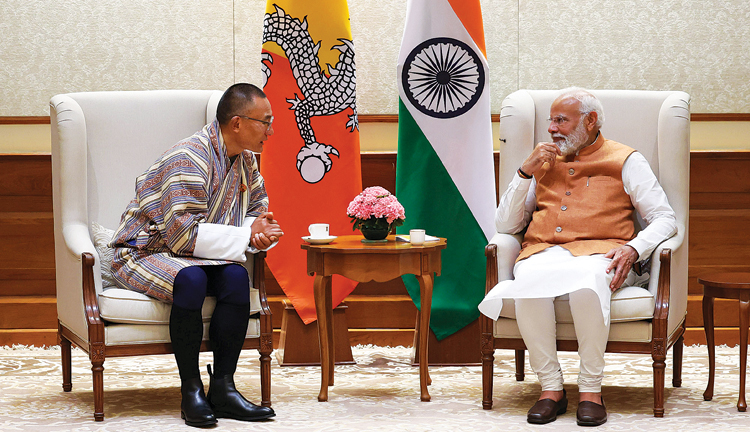INDIAN ARMED FORCES CHIEFS ON
OUR RELENTLESS AND FOCUSED PUBLISHING EFFORTS

SP Guide Publications puts forth a well compiled articulation of issues, pursuits and accomplishments of the Indian Army, over the years

I am confident that SP Guide Publications would continue to inform, inspire and influence.

My compliments to SP Guide Publications for informative and credible reportage on contemporary aerospace issues over the past six decades.
EXCLUSIVE
“Our focus and priority are to nurture the friendship with India when it comes to international relations” — Tshering Tobgay, Prime Minister of Bhutan
In a very exclusive interaction, Manish Kumar Jha speaks with Prime Minister Tshering Tobgay in Thimphu, Bhutan over the range of issues which will further reaffirm the historic bilateral relations with India

PRIME MINISTER, BHUTAN
India and Bhutan are the closest partners. In fact, India, and Bhutan’s partnership span across economic, security as well as cultural ties. The historic partnership is unfolding in a new era in different dimensions. Although small in size, Bhutan holds a unique position providing an alternative model of development and despite the economic pressure and dimensions within, Bhutan is sticking towards its sustainability programme.
Manish Jha (Jha): India-Bhutan relations are the closest between the two neighbours despite deferring in size vastly. What is behind such relations?
Prime Minister Tshering Tobgay (PM Tobgay): Yes, we are a close neighbour and family but our friendship is special. Because not just to the test of time but over the decades it has been going from strength to strength. What drives our friendship is our leadership. In this case, it is our successive enlightened monarchs who have nurtured our friendship with India and ensured that our friendship grows from strength to strength.
“Under Prime Minister Narendra Modi, the friendship between our two countries has grown to unprecedented levels.”
In India, it is your successive Presidents and Prime Ministers and most recently, Prime Minister Narendra Modi. Under his tenure, the friendship between our two countries has grown to unprecedented levels. And this is why I say our friendship is special. It is unique. It is an example of good neighbourliness and good friendship for the rest of the world and that friendship is developed, nurtured, and maintained.
Jha: Prime Minister, the leadership in Bhutan in the democratic setup charted its economic development path. It is based on the alternative model of the Gross Happiness Index which is the measurement of Bhutan’s economic development. While accepted, it is also debated. Could you talk about the economic progress? How is it unfolding?
PM Tobgay: Gross national happiness puts the happiness and well-being of our people at the centre of the development agenda. Gross national happiness attempts to balance economic growth. Economic growth is important, that’s undeniable. But economic growth must be balanced with social progress equity, environmental preservation, culture and good governance. This holistic form of development is the so-called gross national happiness, and we attempt to be true to the ideals and principles of gross national happiness in developing our economy.
Are we there yet? Not by a long shot! We have a lot to do in strengthening our economy and growing our economy and in doing so we aspire to continue to be faithful to the principles and ideals across National happiness that has gotten us this far.
Jha: Bhutan’s concerns for the environment are globally recognised as the only carbon-negative country. It is also a difficult debate against the demand for urban modernisation and Industrial expansion. What is your model for future sustainability in that case?
PM Tobgay: Well, we are fortunate. And we are proud that we are. About the negative carbon country, as you pointed out, we are just 1 of 3 countries worldwide the other two being Panama and Suriname. Then being a carbon negative, we were the first to be recognized as such. We are a carbonnegative [Country] because of the enlightened leadership and enlightened policies of our kings. We are carbon-negative because of the ideals of gross national happiness.

We aspire to continue to be carbon-negative as we continue to grow in our development Journey. Urban living does not necessarily have to be environmentally destructive. We can have a middle path where people can live in an environment space which is respectful of one another and is respectful.
His Majesty, the King’s Royal vision of a city that will be spread across more than 2,000 square kilometres, which will encompass at least two of our ancient protected areas. That’s going to be carbon negative and that is going to be one of the most sustainable cities in the world. To assume the middle path between urban growth, urban living and natural sustainability. In Bhutan, we have the upper hand because it is basically, an extension of gross national happiness.
Jha: Bhutan’s thrust on clean energy especially in the sectors of hydropower, solar and green hydrogen is a priority. Could you talk about the road map for further growth based on clean and green energy?
PM Tobgay: Well except for a few outliers, in the world, almost everybody has accepted, that green energy is important, that we cannot continue to depend on fossil fuels that this is bad for our planet--bad not just for the future but for ourselves closer to our home. And so, a similar intensity in focusing on green energy in Bhutan. We are blessed because in the Himalayas we have a lot of fast-flowing rivers which can generate more than 30 gigawatts of clean energy. We have generated 30,000 megawatts of clean energy and so far. While we are already exporting electricity to India. We have tapped only 7.5 per cent of our potential. We are going to accelerate the development of hydropower production in the country. Plus, we are accelerating the development of solar.
Jha: Bhutan is also embarking on an ambitious plan towards rapid socio-economic progress and technological advancement with new and emerging technologies. What are the challenges in terms of funding and skill development? And how are you progressing? What’s your vision?
PM Tobgay: Well, we don’t have a choice. We have to adapt. Digital advancement does not just adopt digital technology but uses it in a relevant way. But remember, technology is not the goal. The idea is to leverage technology and use technology to grow mindfully and to enhance the happiness and well-being of our people. Now, because we have a small economy and a small population of just 7 lakh people, the per capita cost becomes prohibitive and this is very expensive for us. But, that said, we don’t have a choice. We must adopt and yes — relevant technologies. And for this, we must prioritise our investments and one of the priorities is digital technology.
Jha: How does Bhutan manage its diplomatic role amid such volatile situations worldwide? It’s often seen as a role model in terms of managing and navigating the clumsy geopolitics today. What is behind that secret?
PM Tobgay: Our main friend, a principal ally is India. To a large degree, our focus and our priority are to nurture the friendship with India when it comes to international relations. Besides India, we have diplomatic relations with only a select number of countries. And with them, we maintain good relations. In fact, we have very few diplomatic missions. It is only a handful of places in the world. And each of those missions look after multiple countries. And they are overstretched. But this is after all a small country, can we engage meaningfully? We sincerely deal with as many countries as possible and we use the multilateral organisations, the UN for example, to engage at a multilateral level to the extent possible.
This is an abridged version. For the complete version of the interview, visit https://www.sps-aviation.com/interviews/?id=58&h=Our-focus-and-priority-are-to-nurture-the-friendship-with-India-when-it-comes-to-international-relations-Tshering-Tobgay-Prime-Minister-of-Bhutan





